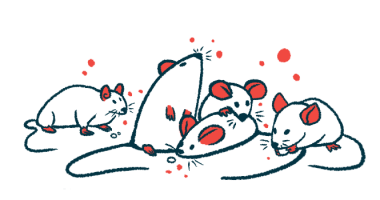Approved Treatments for Cystic Fibrosis
There is no cure for cystic fibrosis (CF) yet, but approved medications and other treatment options can help improve patients’ quality of life, ease symptoms, and slow the disease’s progression. Some of these therapies approved for the treatment of CF are summarized below.
Antibiotics
The mucus that accumulates in CF is rich in polysaccharides and proteins, presenting an ideal culture medium for the growth of different kinds of bacteria. The lungs are particularly vulnerable in patients with CF, making them susceptible to a wide range of acute and chronic bacterial infections. There is a complex arsenal of antibiotics to combat these infections.
Based on the route of administration, these antibiotics can be classified into four categories: oral (taken by mouth), intravenous (injected into the bloodstream), intramuscular (injected into a muscle), or inhaled. The antibiotics can be sub-classified further based on their origin, the class of bacteria they target, and their mechanism of action. Staphylococcus aureus, Haemophilus influenzae, Pseudomonas aeruginosa, and Burkholderia cepacia are some common bacterial species that can infect CF patients and are the target of the most commonly used antibiotics.
Aminoglycosides
Aminoglycosides are a group of antibiotics indicated for the management of acute exacerbations in CF patients and to treat Pseudomonas aeruginosa infections. They work by preventing bacterial protein synthesis. Tobramycin, amikacin, and gentamicin are the main aminoglycosides.
Aztreonam
Aztreonam is an antibiotic recommended in an inhaled solution form for cystic fibrosis (CF) patients with infections due to the Pseudomonas aeruginosa (P. aeruginosa) bacteria. Inhalation of the solution helps the antibiotic quickly enter the circulatory system and body tissues. It is in a class of medications known as monobactam antibiotics.
Cephalosporins
Cephalosporins are a group of broad spectrum antibiotics that come from the mold Cephalosporium. They are classified according to their generation, depending on their antibacterial activity, their structure, and their distinctive target. Cephalexin, cefdinir, cefprozil, and cefaclor are cephalosporins that treat Staphylococcus aureus infections and cefuroxime is used for Pseudomonas aeruginosa infections.
Macrolides
Macrolides are a group of antibiotics found in bacteria called streptomycetes. People with CF may be prescribed macrolides for a long period of time to treat lung infections on an ongoing basis. They have the ability to disrupt Pseudomonas aeruginosa’s connection to cells in the body. Macrolide-based antibiotics include erythromycin, clarithromycin and azithromycin.
Penicillin
Penicillin is a bactericidal, that is, it directly kills the bacteria. It is a narrow-spectrum antibiotic that can treat infections caused by Staphylococcus aureus and Pseudomonas aeruginosa, in CF. The antibiotic can be taken as a tablet, intravenously, or intramuscularly. Some CF patients may be allergic to penicillin.
Quinolones
Quinolones are synthetic broad-spectrum antibacterial agents. They kill bacteria by stopping an important enzyme needed for their replication. Quinolones, which include ciprofloxacin and levofloxacin, are approved to treat conditions such as lower respiratory tract infections, skin infections, and urinary tract infections — all of which are common in people with CF.
Sulfonamides
Sulfonamides (also called sulfa drugs) are a group of broad spectrum and action antibiotics derived from sulfanilamide. The first class of antibiotics discovered, they stop the growth and replication of bacteria by preventing bacterial folic acid synthesis. Sulfisoxazole is a sufonamide that can treat Pseudomonas aeruginosa and Staphilococcus aureus infections in people with CF, but the use of sulfonamides has diminished with newer and more effective antibiotics.
Tetracyclines
Tetracyclines are broad-spectrum antibiotics derived from Streptomyces bacteria. They work by inhibiting the synthesis of bacterial proteins. Tetracycline and the related compounds doxycycline, minocycline, and tigecycline alleviate chronic inflammatory airway conditions such as CF.
Zyvox
Zyvox (linezolid) is an antibiotic used to treat methicillin-resistant Staphylococcus aureus (MRSA) infections in people with CF. The number of MRSA infections, which are highly resistant, is increasing in people with this disease, and is associated with delayed recovery from exacerbations and accelerated decline of lung function in children with CF. It is in a class of antibiotics known as oxazolidinones.
CFTR Modulators
CFTR modulators are a specialized group of CF therapies designed to address the underlying cause of CF according to the specific defect in the CFTR protein. There are three main types of CFTR modulators: potientators, correctors, and amplifiers.
CFTR potentiators act by holding open a key gate within the protein in a correct conformation long enough to facilitate the transport of chloride ions across the channel. Correctors are aimed at overcoming folding defects within the CFTR protein. Amplifiers are intended to enhance the amount of functional protein present on the cell surface.
Alyftrek
Alyftrek is a next-generation combination of three medications, vanzacaftor, tezacaftor, and deutivacaftor, that collectively work to increase functionality of the defective CFTR protein. It is meant to have superior efficacy and more convenient dosing compared to Trikafta.
Kalydeco
Kalydeco (ivacaftor)is a CFTR potentiator designed to treatcaused by gating mutations. These mutations result in the production of a faulty CFTR protein that causes the “gate” that controls the movement of charged salts, such as chloride and sodium, in and out of cells to be stuck closed. Kalydeco by keeping the CFTR gate open for longer at the cell surface.
Orkambi
Orkambi is a combination of lumacaftor and ivacaftor, which together target the defective chloride channels in CF. Lumacaftor is a corrector that binds to the faulty CFTR protein and helps it fold correctly, while ivacaftor is a potentiator that helps defective channels work better. Orkambi works for patients with the F508del mutation in both copies of the CFTR gene.
Symdeko
Symdeko (Symkevi in the EU and U.K.) is a combination of tezacaftor, a CFTR corrector; and ivacaftor, a potentiator. The mutations for which the treatment is approved vary by country. In most cases, it is only approved for patients with two copies of the F508del mutation in the CFTR gene, or one copy of the F508del mutation and one of 14 other deletions.
Trikafta
Trikafta is a next-generation combination of three CF medications: elexacaftor, tezacaftor, and ivacaftor. It helps defective CFTR proteins work more effectively. Both elexacaftor and tezacaftor work as correctors, helping the faulty protein fold correctly. Ivacaftor is a potentiator, holding the channel open so that more salt can pass through it.
Inhaled Therapies
Many people with CF use inhalation devices and inhaled therapies to help maintain lung health and function. Various forms of inhalation devices can be found to help treat CF. These devices are used to deliver medication directly to the lungs, working to help alleviate symptoms of the disease. These include metered dose inhalers, conventional nebulizers, ultrasonic nebulizers, vibrating mesh technology nebulizers, and adaptive aerosol delivery nebulizers. There are different types of therapies that may be inhaled including bronchodilators, mucolytics, corticosteroids, and some antibiotics.
Bronchodilators
To prevent bronchospasms (a sudden constriction of the airways) and to ensure that CF patients can get a full dose of any inhaled medications they may be using, bronchodilators are often prescribed. These are medications (usually inhaled) that cause the smooth muscle surrounding the airways to dilate or relax, allowing the lungs to fill more easily with air.
Inhaled Corticosteroids
Inhaled corticosteroids have fewer side effects than oral formulations because they act locally in the airways, and they are often used to treat CF. Clinicians also tend to prescribe them because they are familiar with inhaled corticosteriods, as they are often used by asthmatic patients. Inhaled corticosteroids that might be prescribed to CF patients include beclomethasone and budesonide.
Mucolytics
The thick mucus produced in CF can clog the airways and trap bacteria, resulting in persistent infections and inflammation. Mucolytics are medications that decrease the viscosity of mucus by degrading the mucin polymers, DNA, or F-actin in airway secretions. This allows for better clearance of the sputum with a cough. There are three types of mucolytics: classic, peptide, and non-destructive.
Other Therapies
Other therapies may be recommended or prescribed by doctors for the management of CF symptoms. These include enzymes that can help replace the pancreatic enzymes that are often lacking in CF patients, along with vitamins to help with nutritional deficiencies and prebiotics and probiotics that address gastrointestinal issues.
Enzymes
The overproduction of mucus in CF patients clog the pancreatic ducts and lead to a loss or reduction of pancreatic enzymes entering the small intestine, causing a condition known as exocrine pancreatic insufficiency. The lack of pancreatic enzymes makes it difficult to break down food and absorb nutrients. Pancreatic enzyme replacement therapy replaces these missing enzymes through pancreatic enzyme products.
Vitamins
Pancreatic enzyme replacement therapy (PERT) can help CF patients absorb nutrients from food more efficiently. However, even though PERT helps to absorb more of these vitamins, CF patients also are typically advised to take fat-soluble vitamin supplements. It’s important for patients to supplement with the right amount of vitamins, because good nutritional status is associated with improved lung function and survival.
Probiotics and Prebiotics
People with CF may have more gastrointestinal problems than healthy people because they are frequently on antibiotic therapy, which kills bad and good bacteria. Particular strains of probiotics may help prevent antibiotic-associated diarrhea and Clostridium difficile-associated diarrhea. Prebiotics are foods that resist digestion and promote the growth of the “good” bacteria in the large intestine.






